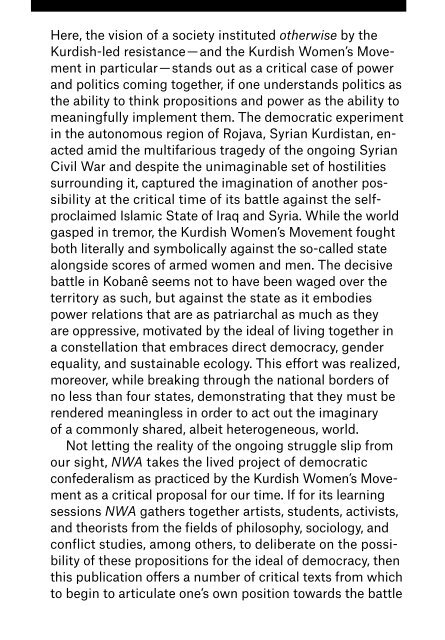Stateless Democracy
NWA5-Stateless-Democracy1.pdf?utm_content=buffer7beda&utm_medium=social&utm_source=twitter
NWA5-Stateless-Democracy1.pdf?utm_content=buffer7beda&utm_medium=social&utm_source=twitter
Create successful ePaper yourself
Turn your PDF publications into a flip-book with our unique Google optimized e-Paper software.
Here, the vision of a society instituted otherwise by the<br />
Kurdish-led resistance — and the Kurdish Women’s Movement<br />
in particular — stands out as a critical case of power<br />
and politics coming together, if one understands politics as<br />
the ability to think propositions and power as the ability to<br />
meaningfully implement them. The democratic experiment<br />
in the autonomous region of Rojava, Syrian Kurdistan, enacted<br />
amid the multifarious tragedy of the ongoing Syrian<br />
Civil War and despite the unimaginable set of hostilities<br />
surrounding it, captured the imagination of another possibility<br />
at the critical time of its battle against the selfproclaimed<br />
Islamic State of Iraq and Syria. While the world<br />
gasped in tremor, the Kurdish Women’s Movement fought<br />
both literally and symbolically against the so-called state<br />
alongside scores of armed women and men. The decisive<br />
battle in Kobanê seems not to have been waged over the<br />
territory as such, but against the state as it embodies<br />
power relations that are as patriarchal as much as they<br />
are oppressive, motivated by the ideal of living together in<br />
a constellation that embraces direct democracy, gender<br />
equality, and sustainable ecology. This effort was realized,<br />
moreover, while breaking through the national borders of<br />
no less than four states, demonstrating that they must be<br />
rendered meaningless in order to act out the imaginary<br />
of a commonly shared, albeit heterogeneous, world.<br />
Not letting the reality of the ongoing struggle slip from<br />
our sight, NWA takes the lived project of democratic<br />
confederalism as practiced by the Kurdish Women’s Movement<br />
as a critical proposal for our time. If for its learning<br />
sessions NWA gathers together artists, students, activists,<br />
and theorists from the fields of philosophy, sociology, and<br />
conflict studies, among others, to deliberate on the possibility<br />
of these propositions for the ideal of democracy, then<br />
this publication offers a number of critical texts from which<br />
to begin to articulate one’s own position towards the battle<br />
over democracy in Kobanê. In doing so, the reader aims to<br />
create insights into how our own version of democracy is<br />
up for contest and that such battles, no matter how far they<br />
may be, are shared by us all.<br />
I would like to take this opportunity to express my<br />
sincere gratitude to all collaborators in this undertaking<br />
and the members of the Kurdish Women’s Movement for<br />
sharing their knowledge with us. My thanks go to Jonas<br />
Staal and his team at New World Summit, as well as my<br />
colleagues at BAK’s home base in Utrecht. I am indebted<br />
to the Doen Foundation, Amsterdam for making the project<br />
possible, as well as to Centraal Museum, Utrecht, whose<br />
acquisition of NWA, as part of the collaboration with BAK<br />
titled Future Collections (2014–2015), contributed significantly<br />
to the realization of this session. Last but not least,<br />
I would like to thank the cultural and educational institutions<br />
De Balie, Amsterdam and the Willem de Kooning<br />
Academy, Rotterdam for hosting this fifth edition of NWA<br />
and its manifold nomadic itinerary.<br />
Maria Hlavajova is artistic director of BAK, basis voor actuele kunst.


